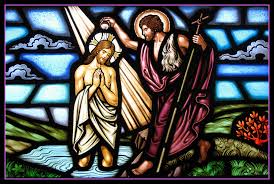CHRISTMAS WEEKDAYS – JANUARY 06
Radical Grace – Radical Newness
(1 Jn 5:5-13; Ps 147; Mk 1:4-11)
**********************************************
“John the Baptist appeared in the wilderness.”
That simple, innocent looking statement holds a radical content that is key to appreciating the gospel. It invites us to place our faith in Jesus as Son of God and to step into a whole new world order, into a whole new universe.
John the Baptist was the son of the temple priest, Zechariah, and should have been in the temple plying a priestly career like his father. His unusual birth to a mother far past child-bearing years and his father’s dumbness during her pregnancy had the Judean hill country people wondering what this child would become.
Well, they had good reason to wonder, for now, as an adult, he was in the wilderness, living in the shadow of the great prophet Isaiah, and of all things, exercising a ministry that was not happening in the official temple – calling people to repentance for their sins through a baptism of water, a new kind of vikmah! No wonder the scribes and Pharisees came to check him out. The unspoken symbolism is that the one for whom he was preparing the way would be bringing into this world something radically new and unheard of before.
The evangelist John, in the first reading, takes great effort to identify the source of that newness – Jesus of Nazareth, the Son of God, who comes with three witnesses – the Holy Spirit, water and blood. That might be the water and blood that gushed from Jesus’ side as he died on the cross, but more likely it is the water of the Jordan, the blood on the Cross, and the Spirit that connects the crib of the nativity to the Cross. Ultimately, the newness would be the gift of eternal life, the very life of God in heaven, that would be shared with those who believe in him.
In his humility, John knew that his baptism was limited to water the soaks paper and a ministry limited to pointing out sin. He could not take away sin. That would be the role of Jesus, who would baptize with the Spirit, like a fire that transforms paper, and carry out a ministry that would transform believers into children of God.
 The theophany that accompanied the baptism of Jesus gives us a prelude of the nature of God – a voice from the heavens, the Spirit descending like a dove, and Jesus in the Jordan, breaking water as a woman does when giving birth, so Jesus was birthing into the world this radical newness.
The theophany that accompanied the baptism of Jesus gives us a prelude of the nature of God – a voice from the heavens, the Spirit descending like a dove, and Jesus in the Jordan, breaking water as a woman does when giving birth, so Jesus was birthing into the world this radical newness.
The Father’s voice was an archetypal blessing, affirming Jesus as the beloved Son totally pleasing to the Father, and giving him the strength to be driven out into the desert to reject the three traditional temptations Israel always succumbed to throughout their history – an over-attachment to possessions, prestige and power. It was that over-attachment and corruption that John the Baptist was protesting by his presence and ministry in the wilderness, preparing for a new reality of heaven being brought to earth.
We who believe can trust that the Father wants to say the same thing to us (“You are my beloved son or daughter, in whom I am well pleased”), when we place our faith in Jesus and strive to follow him by loving as he has loved us. We too can experience the power of that archetypal blessing and live out its energy in our lives.
The Eucharist is an occasion when we listen to the voice of God affirming us and blessing us with love, forgiveness and healing through Jesus the beloved Son.
May our celebration empower us to place our faith in him, and follow him into a radically new way of life and love throughout this new year.



